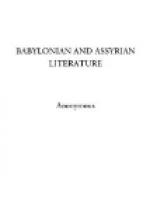1 Take a woman’s linen kerchief 2 bind
it round thy right hand! loose it from the left hand!
3 Knot it with seven knots: do so twice:
4 Sprinkle it with bright wine: 5
bind it round the head of the sick man: 6 bind
it round his hands and feet, like manacles and fetters.
7 Sit down on his bed: 8 sprinkle holy water
over him. 9 He shall hear the voice of Hea, 10
Davkina[1] shall protect him! 11 And Marduk, Eldest
Son of heaven, shall find him a happy
habitation![2]
[Footnote 1: One of the principal goddesses, the wife of the god Hea.]
[Footnote 2: “Trans. Soc. Bib. Arch.,” vol. ii. p. 84.]
TALISMANS
To cure diseases they seem to have relied wholly on charms and incantations.
The first step was to guard the entrance to the sick man’s chamber.
A tablet says:
“That nothing evil may enter, place at the door the god (...) and the god (...).”
That is to say, their images. I believe these were little figures of the gods, brought by the priests, perhaps a sort of Teraphim.
The following line is more explicit: “Place the guardian statues of Hea and Marduk at the door, on the right hand and on the left.” But they added to this another kind of protection:
1 Right and left of the threshold of the door, spread
out holy
texts and sentences.
2 Place on the statues texts bound around them.
These must have been long strips like ribbons of parchment or papyrus. The following line is still clearer:
“In the night-time bind around the sick man’s head a sentence taken from a good book."[10]
[Footnote 10: Similar to these were the phylacteries of the Jews, which were considered to be protections from all evil. Schleusner in his Lexicon of the New Testament says that they were “Strips of parchment on which were written various portions of the Mosaic law, for the Jews believed that these ligaments had power to avert every kind of evil, but especially to drive away demons. as appears from the Targum on the Canticles,” etc. We see that the Babylonian precept was to bind holy sentences “around the head” and others “right and left of the threshold of the door.”
Cf. Deut. xi. 18: “Ye shall lay up these my words in your heart, and in your soul, and bind them for a sign upon your hand, and as frontlets between your eyes.
“And thou shalt write them upon the door-posts of thine house, and upon thy gates.”]
HOLINESS OF THE NUMBER SEVEN
Innumerable are the evidences of this opinion which are found on the tablets. Two or three instances may suffice here:
THE SONG OF THE SEVEN SPIRITS [Footnote: “Trans. Soc. Bib. Arch.,” vol. ii. 2 p. 58.]




